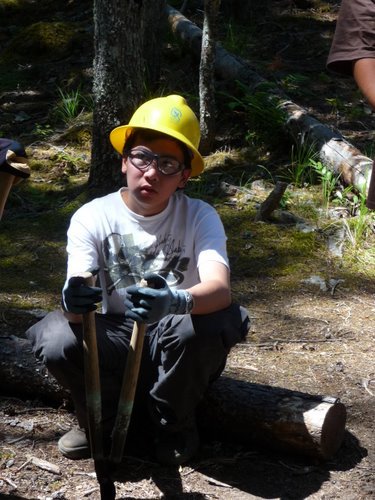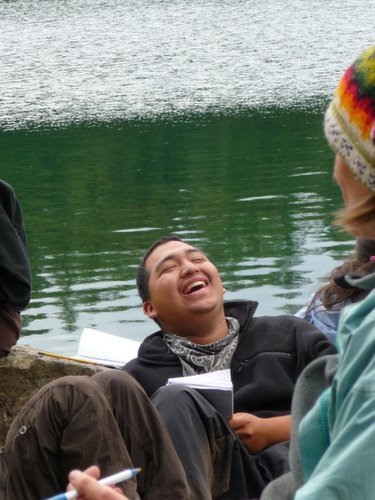Twelve days on Ross Lake
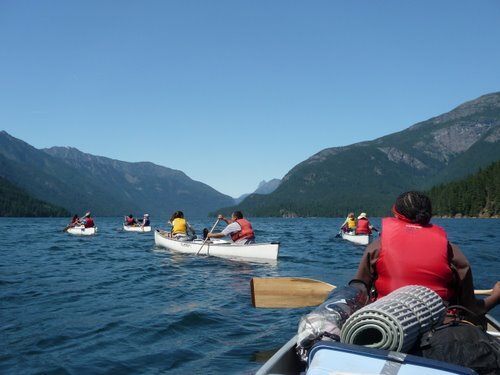 The first two North Cascades Wild trips of 2009 have returned home after 12 days of backpacking, canoeing and service projects on Ross Lake. Eighteen students and six instructors, divided into two groups, embarked on what has become an annual adventure at the North Cascades Institute. The following is a chronicle of one of those adventures, North Cascades Wild Trip 1.
The first two North Cascades Wild trips of 2009 have returned home after 12 days of backpacking, canoeing and service projects on Ross Lake. Eighteen students and six instructors, divided into two groups, embarked on what has become an annual adventure at the North Cascades Institute. The following is a chronicle of one of those adventures, North Cascades Wild Trip 1.
Our first day together was a whirlwind of driving, Leave No Trace presentations, name games, visits to both the Wilderness Information Center in Marblemount and the North Cascades National Park visitor center in Newhalem, and finally gear packing at the Environmental Learning Center. Most of our students had never slept in a tent, carried a backpack, or eaten s’mores before they joined NC Wild! This night was just the beginning of what would be a grand adventure.
Our first full day together we were all up bright and early, ready to get in our canoes! An early start was essential as there is a lot to learn your first day of camping and canoeing. Students learned canoe paddling techniques, how to tie up the canoes, participated in “tent olympics” and for many tried GORP for the first time!
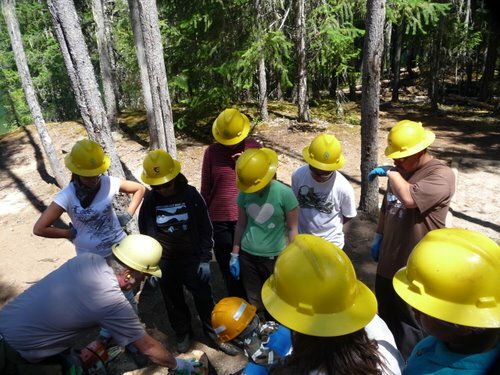 (Top) Paddling toward Big Beaver campground. (Above) Mike Brondi, North Cascades National Park Volunteer Coordinator, talking to students about Lodgepole pine trees, forest ecology and hazard trees.
(Top) Paddling toward Big Beaver campground. (Above) Mike Brondi, North Cascades National Park Volunteer Coordinator, talking to students about Lodgepole pine trees, forest ecology and hazard trees.
NC Wild participant, Ramsel, learning about tools and safety.
NC Wild trips aren’t just about camping, backpacking and canoeing. We also work with the North Cascades National Park to conduct a variety of service projects. Our first project involved helping Mike Brondi remove hazard trees from Spencer Island campground. Of course, a dip in the lake was required after our hard work. A new project NC Wild had undertaken this year is studying Red Sided Shiners. This fish species is a non-native to the lake and biologists aren’t yet sure what their impacts will be. NC Wild participants will study where the fish are found, water temperature, dissolved oxygen levels, water depth and number of fish. It is an exciting new project that introduces students to research techniques and citizen science.
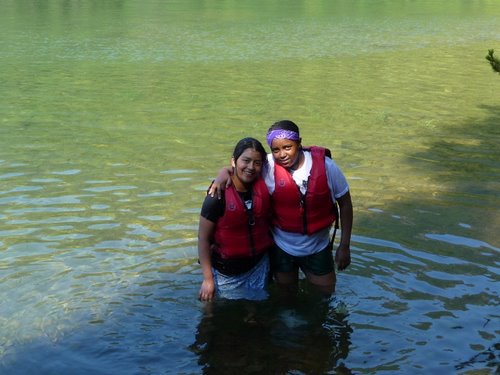 Esmeralda and Rahel, both of whom learned to swimming on this trip.
Esmeralda and Rahel, both of whom learned to swimming on this trip.
After a few days at Big Beaver Campground we headed north, our destination was Lightning Creek stock campground. Along the way we saw Ospreys, Bald Eagles, a marmot (!) and swarms of Red Sided Shiners. The paddle was long but well worth the effort, this was one of the groups favorite sites. The barge was perfect for sunset meetings, Wilderness history skits and for jumping off of.
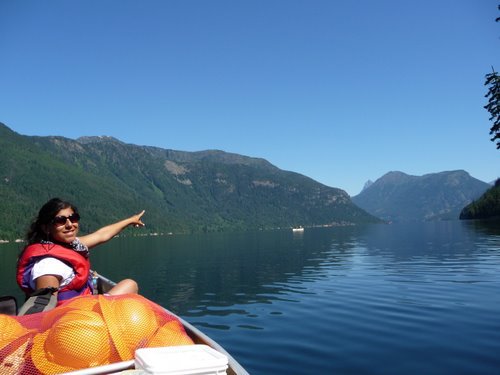 Indira pointing at Desolation Peak, which we climbed!
Indira pointing at Desolation Peak, which we climbed!
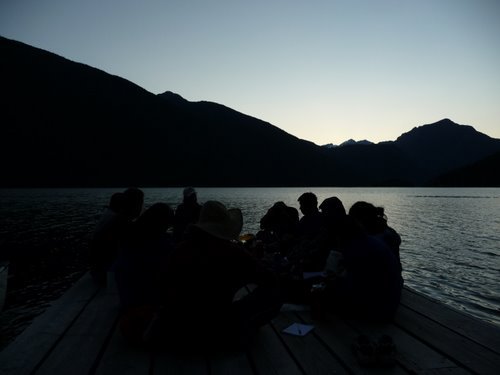 Sunset on the Lightning Stock camp barge
Sunset on the Lightning Stock camp barge
On July 4th the camp alarm clock went off at 5am! The plan for the day was to climb Desolation Peak. And we did! The day started with a two mile paddle to the Desolation trailhead and then a 4,600 vertical foot climb, covering 4.8 miles. The views were stunning, wildflowers along the trail were blooming and stories and songs carried us up the peak. We reached the summit around 4pm and celebrated with gatorade, snickers bars and a Gary Snyder reading.
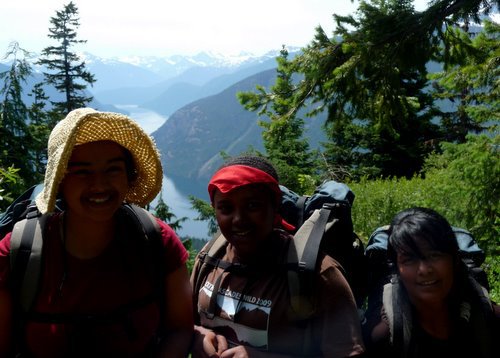 Gladis, Rahel and Esmeralda hiking up Desolation Peak
Gladis, Rahel and Esmeralda hiking up Desolation Peak
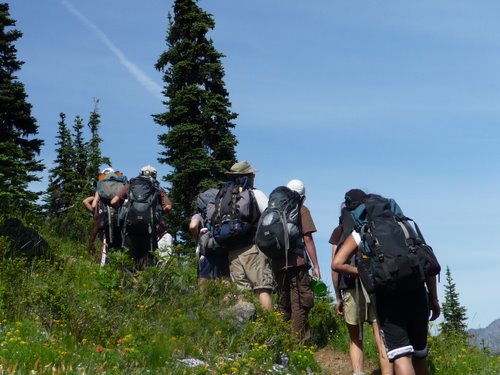 Almost there….the trail to Desolation Lookout.
Almost there….the trail to Desolation Lookout.
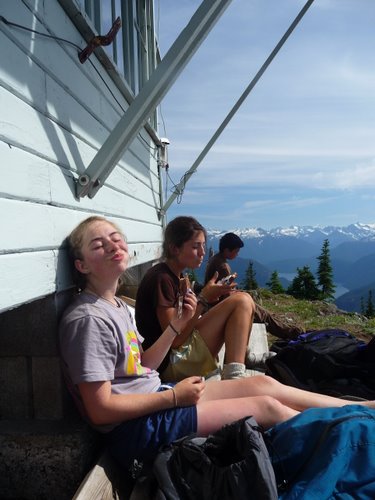
Snickers bars at the top of Desolation
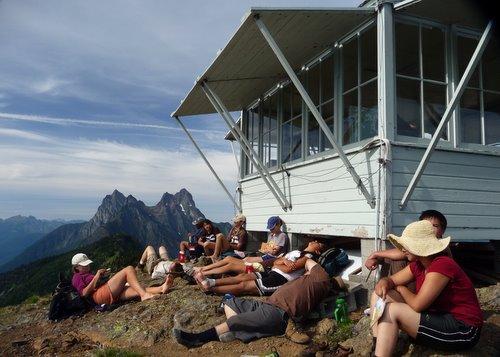 Amy sharing excerpts from the Dharma Bums.
Amy sharing excerpts from the Dharma Bums.
The day after climbing Desolation we had a leisurely morning in camp before turning over out canoes to NC Wild trip 2. It was a bittersweet day for some of us. Everyone was excited to try backpacking but there was some apprehension around camp…..what would it be like to carry a heavy backpack 7 miles? But, before trying our hand at backpacking we hiked to Dry Creek to pull Reed Canary grass and do some erosion control.
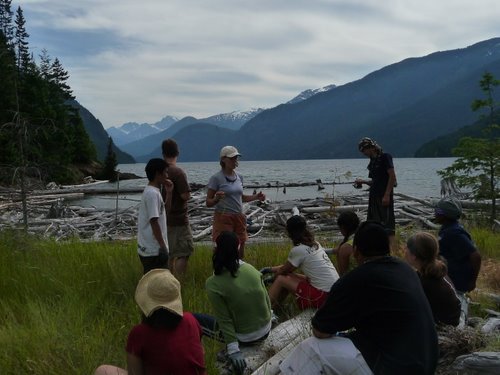 Amy explaining the impact of invasive species and erosion at Dry Creek
Amy explaining the impact of invasive species and erosion at Dry Creek
Our first day of backpacking lead us to Nightmare camp. Not a particularly inspiring camp name, but the camp itself was inviting. Huge, old-growth cedar trees towered above us and the creek nearby sang it’s peaceful song. This was only a short stop-over on our way to Hozomeen Lake, were we would stay for a few days. At Hozomeen Lake we dug a new pit toilet (!), brushed trails, used the art kit to make cards and pictures for friends and family, listened to Loons calling at sunset, spent time reflecting on this amazing experience in the North Cascades and we had two special visitors from the National Park!
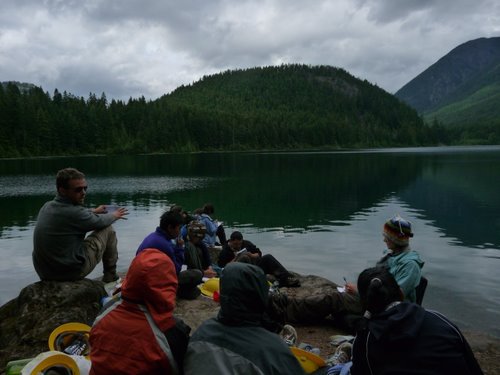 Talking about Stewardship on the shores of Hozomeen Lake.
Talking about Stewardship on the shores of Hozomeen Lake.
Hairo laughing at one of Amy’s many jokes.
And then, it was time to board the Mule and head home. Gerry Cook, Captain of the Mule, picked us up at Hozomeen Camp and we spent the day motoring down the lake to Green Point. Along the way we enjoyed beautiful views, all of the students had an opportunity to share their stories and of course we played some games.
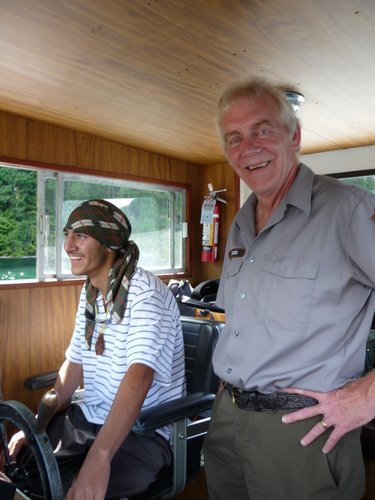
Captains’ Gerry Cook and Mohib, an NC Wild student!
On our last night together we sat around the campfire at Green Point and shared stories and gave thanks for 12 wonderful days together on Ross Lake. That last night was bittersweet. We were all excited to go home and share stories with our friends and family, but we were leaving new friends behind. I’ve been told that every new beginning comes from another beginnings’ end, so we have now all started something new. Perhaps some of the students will go home and teach others about wilderness, consider their impact, spend time in parks in their communities, or bring their friends and families to the North Cascades National Park! Whatever their new beginnings are I wish them well and thank them for sharing this great experience with me!
All photos courtesy of Jenny Lee.

